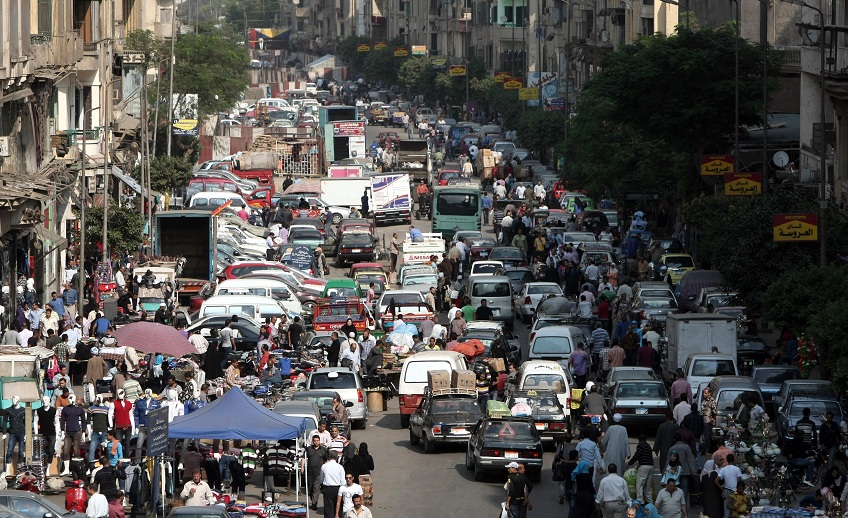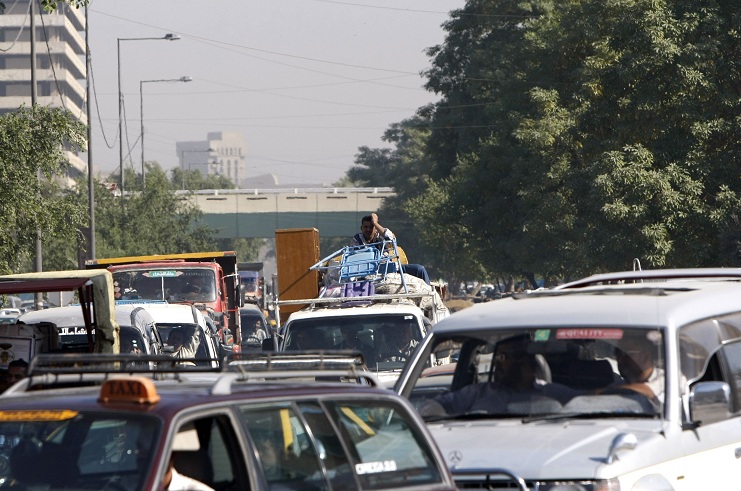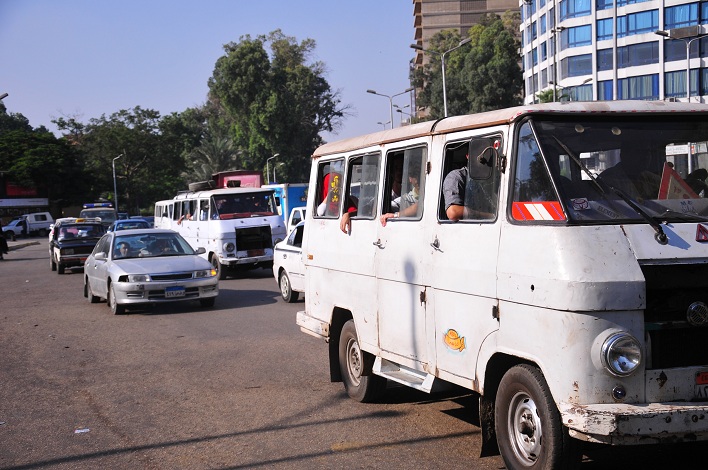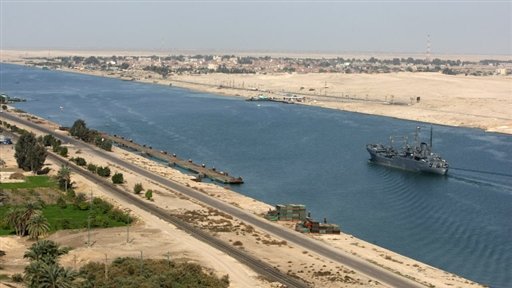
AFP PHOTO / MAHMUD HAMS
By Michael Fox
Driving his taxi, Mansour who does not want to give his surname, spends 12 or 13 hours on Cairo’s roads every day.
By his estimate he spends seven of those hours stuck in traffic and sees a handful of crashes daily which he says are mainly the result of aggressive truck drivers and bad roads.
He picks up only around three or four fares a day but believes that it would be as many as 12 if he could get around better.
Like many Cairenes, he’s had enough. He’s so fed up with it that once he pays off his car, he says he’s getting rid of it.
“I’ve been driving for 25 years but the moment I’ve paid off my car I want to sell it.”
He wants order restored and says he would follow the road rules if everyone else did but he has little faith in traffic police or plans to fix the city. His solution for the city’s traffic woes is to “move to the moon.” While he sets his sights on that, others are looking for real alternatives to the city’s traffic chaos.
Data collection here is unreliable – something experts say is a major part of the problem – and estimates on the number of crashes and related casualties vary as a result.
The number of accidents dropped by 31 per cent in Egypt last year, reportedly due to the imposition of curfews in major centres following the revolution, but almost 17,000 accidents were still recorded according to official statistics.
A total of 7,115 people were killed at a rate of just under 20 per day while 27,479 were injured.
In Cairo alone, a recent World Bank report said that 1000 die as a result of traffic accidents each year – half of those being pedestrians – while 4000 are hurt.
On top of this, the report put the estimated economic cost of congestion at US$8billion a year, or up to four per cent of Egypt’s GDP and more than four times that of comparable large cities.
The average commute for the city’s estimated 2.2million vehicles is said to be 37 minutes while it is set to stretch to 150 minutes by 2015, according to some reports.
Experts say there are a number of factors behind the shocking statistics: too many cars on poor roads, no road rules, a lack of safe areas for pedestrians, a lack of public transport, lack of data collection and poorly-chosen roading projects coupled with an historical lack of political will to do anything about it.
President Mohamed Morsy has promised to try and curb the problem though he faces a mammoth task – one of many confronting the newly-elected leader – and experts remain sceptical about both his will and his capacity to generate the massive changes needed.

DNE archive
The situation looks dire but those spoken to by the Daily News Egypt believe the problems are not that hard to fix and have been overcome by major cities in the past. They agree improving public transport is the best way forward.
“Cairo has lots of potential, it’s not so messed up. It looks and seems bad but the structure is fine,” Professor Christian Bauriedel, an urban planning expert at the American University in Cairo says.
“I think Cairo has big potential. It could be a very nice and beautiful city in a very little bit.”
While a fan of the metro system, Bauriedel says three lines for the city’s seven million people is woefully inadequate. In comparison, he pointed to Munich which he says has 20 lines for 1.3 million people.
“It’s nearly nothing but it manages to do 30 per cent of the transportation [in Cairo].”
“The priority for me would be to create another 10 or 15 metro lines as soon as possible.”
Cairo’s population density and layout makes it conducive to massive and immediate benefits from good public transport systems and Bauriedel believes that the new metro lines in conjunction with another 200 new bus lanes could cut traffic by up to 40 per cent.
“If you reduce traffic by 40 per cent you don’t have jams anymore, except of course during rush hour. And it would really be a rush hour – not rush 15-hours.”
“I think that would be the main thing to do to get Cairo back to a healthy city.”
Bauriedel pointed to a 16km car trip from Dokki to Heliopolis which could take an hour and a half. On a bike, for those willing to brave the extreme traffic and pollution, it could be done in 30 minutes.
Free the air
Removing that much traffic would also drastically reduce the level of air pollution in Cairo, he says. Largely as a result of the traffic, Cairenes are subjected to chronic levels of air pollution, said to be between 10 and 100 times higher than acceptable levels, while the noise levels are also dangerously high.
Cairo urban planning historian, Mohamed Elshahed, agrees that public transport should be the focus.
Pointing to the estimated economic cost of congestion and comparing it with the EGP1 billion it took to build the first phase of the third metro line, he says the projects would quickly pay for themselves.
“It’s not that expensive to transform this place if there is the political will to do this.”
“The two existing lines are under a lot of pressure but they are very well used… It’s one of the systems in the state that’s relatively well-run.”
More efficient public transport in densely populated areas would have “incredible impact very visibly” if done properly.
Elshahed believes order is something Cairenes are hanging out for – so much so that road rules are part of what attracts them to other parts of the world, including the Gulf.
“This is a political issue. This has nothing to do with culture. This has nothing to do with DNA.”
Egyptians coped remarkably well considering, he said, saying the result of such a lack of rules in cities such as New York and London would be utter chaos.
Both however, are unconvinced the improvements will come.
Bureaucracy and self-interest have stood in the way of progress previously and public transport was not popular with decision makers because it was not profitable.
Says Bauriedel “You solve the problems of Cairo but you don’t make money. People see advantage for themselves rather than good for the city,”
He disagrees with the creation of the new desert towns outside the city saying the sprawl creates new problems and solves none of the old ones – including traffic.
He blames the poor decisions on the fact that they are made by people with no expertise in urban planning – the military and the police – who he says want to do the least amount of work for the greatest financial gain and who were not looking at the longer-term.
“It just needs a bit of organisation.”
Elshahed says the government has previously seemed more focused on ensuring cars were sold and reaping the import tax rather than trying to solve the issue of congestion.
This was emphasises in the previous approach to the building of new roads, instead of addressing areas of the greatest concern, roads were built to suit the whims and wants of the rich and well-connected; a road to a government minister’s house for example.
“It’s sometimes that obvious,” he said.
Hope for change
The new government had made attempts to show they were more interested in ensuring things ran smoothly but he has seen little evidence of the sorts of massive structural changes he says are needed.
He believes it starts with accountability at the top – someone needs to be responsible for Egypt’s roads. Below that roading czar needs to be officials in each governorate who have local road knowledge and expertise, rather than all decisions coming from a central authority.
“The people that are in charge supposedly in charge know very little about the city and its totality.”
“For me the most important part is responsibility – nobody takes responsibility for anything.”
Forensic scientists are needed to investigate accidents and their causes, data needs to be collected and analysed, drivers need to face more strident testing, cars and roads need to be better maintained and traffic laws need to be applied universally and enforced.
Fuel subsidies for private vehicles should be removed though they should still apply to taxis and buses. Around 24,000 cars were sold in Egypt each month, with the government reaping a massive import tax on top, and the infrastructure could not cope.
Bauriedel also says the lack of adequate vehicle inspections is a major issue, pinning the blame for many of the country’s accidents on unsafe vehicles, particularly truck and trailer units with faulty brakes.
From personal experience, inspectors were more worried about things like the car interior than its safety, he said.

Hassan Ibrahim / DNE
Egyptian Road Society spokesman Adel el-Kashef told the Egyptian Gazette last year that bad roads were responsible for 20 to 30 per cent of accidents while poor car maintenance was responsible for 10 to 15 per cent.
Pent up frustrations caused by the jams also leads to people driving more recklessly when in the clear, he said.
Potential for technology
Meanwhile, the government is also turning to technology to try and find the answers to the traffic problem.
In partnership with the World Bank and technology giants including Google and Vodafone as well traffic experts and tech entrepreneurs, the government is looking for tech alternatives for solutions as part of a competition called the Cairo Transport App Challenge.
At a meeting in June, participants identified six problem areas where technology could help: harassment on public transport, a lack of regulations for taxi and tok tok drivers who stop where they please and cause problems, a lack of enforcement of road rules, poor driver education and behaviour and inadequate and un-standardised data collection.
The group has launched a competition for developers to come up with IT solutions which would utilise the country’s high rate of cell phone penetration to help combat the problems.
Others are working on green initiatives such as promoting cycling and walking as opposed to motorised transport, though they first have to confront issues of safety. Others are focussed on decreasing sexual harassment on public transport to make it safer for women to use.
The government has also identified street vendors as major causes of congestion and its latest move has seen police move them on to safe zones though those moves are being met with stiff resistance.
A third Metro line stretching 4.2km was opened in Cairo this year while a fourth is also under construction though it is not set to be completed till 2020. That 17km line will connect central Cairo with tourist attractions including the Giza pyramids.
Continuing the theme of bringing in outside help, Elshahed suggests the investigation of private-public partnerships for creating public transport projects.
“I think a combination of civil society and partnerships with private interests might be the best way to pressure the government to actually change things.”
After surviving without an effective government for so long, the city’s current transport system was the result of Egyptians figuring things out for themselves, something the populace was used to having to do.
Driving in Egpyt has become a competition – survival of the fittest, or the best or luckiest drivers.
“If you follow the basic rules it doesn’t matter how good or bad a driver you are, you should be able to get home safely.”
However, he was against borrowing to build what he sees as necessary.
Egypt has a history of borrowing, with little of that money going to the people, he said. It was spent on things like food subsidies which helped but which did not generate revenue with which to pay the loan back – hence the scepticism about the IMF loan which Elshahed thinks is a bad idea.
“It’s not generating more [money] to pay the loan back… Very little money is left for these kinds of issues.”
Elshahed is opposed to increasing prices to help fund more initiatives but said there were ways to make more money from the system including by increasing advertising in stations, with many of the advertising boards remaining vacant.
The government would also make more money by freeing up the roads, allowing goods and services to be transported more freely, and allowing people to get around easier to spend money, he said.
Mansour the taxi driver would be happy with that.


